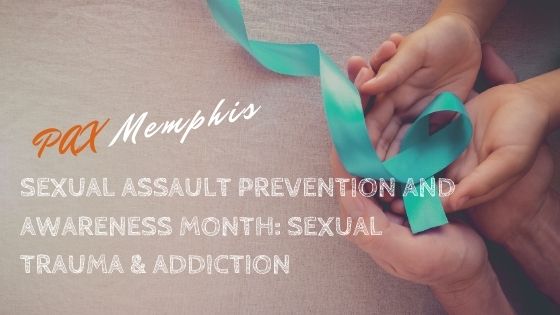Sexual assault and abuse, no matter what form they take, are painful, devastating, and traumatic. They can affect a victim’s life forever and influence the way they think, feel, act, and react in virtually every situation. Unfortunately, many victims of sexual assault and abuse turn to drugs and alcohol if they have no other way of coping with what they have been through.
According to RAINN (Rape, Abuse & Incest National Network), the nation’s largest anti-sexual violence organization and operator of the National Sexual Assault Hotline (800-656-HOPE), child protective services substantiates or finds evidence for a claim of child sexual abuse every 9 minutes. Overall, 1 out of every 9 girls and 1 out of every 53 boys under the age of 18 will experience sexual assault or abuse by an adult. And, victims of sexual assault are thought to be four times more likely to abuse drugs, four times more likely to develop PTSD, and three times more likely to struggle with major depressive disorder.[1]
April is Sexual Assault Prevention and Awareness Month – a time to reflect and spread awareness about the gravity of sexual assault and how it impacts people’s lives. Since child sexual abuse is linked to higher rates of depression, substance use, PTSD, and suicide, it’s important to look at the relationship between sexual trauma and addiction – and how survivors can recover.
Symptoms of PTSD and Depression After Sexual Assault or Abuse
Regardless of the age at which sexual assault or abuse occurs, it has long-term effects on the victim’s mental health. According to Mental Health America, many survivors report feeling shame, isolation, confusion, shock, and guilt.[2]
As a result of these sustained emotions, people who are victims of rape or sexual assault/abuse are at an increased risk for a variety of mental health issues, including:
- Depression
- Post-Traumatic Stress Disorder (PTSD)
- Anxiety
- Eating Disorders
- Substance Use Disorders
Symptoms of trauma may occur minutes, days, weeks, or even years after a traumatic experience occurs. People with sexual trauma often develop some degree of PTSD. Common symptoms of PTSD among survivors include:
- Experiencing lingering feelings of guilt or shame related to the incident
- Having mood swings or experiencing chronic depression and anger
- Struggling with nightmares, flashbacks, or intrusive thoughts/memories related to the event
Sadly, many survivors of sexual abuse may abuse drugs or alcohol to cope with these feelings, ultimately causing them to develop an addiction.
The Relationship Between Sexual Trauma and Addiction
There are many reasons why a childhood trauma survivor or sexual assault survivor would fall into a pattern of drug and alcohol abuse. The first is to cope with their mental health issues, whether it be symptoms of PTSD, depression, or anxiety. These conditions, in addition to sexual assault or abuse, can damage a person’s self-worth and self-esteem, leading to isolation and loneliness. As a result, individuals may continue to abuse drugs and alcohol to cope with these feelings.
Another reason why some survivors may abuse drugs and alcohol is to punish themselves for the abuse that occurred. Guilt and shame can be misplaced after trauma, and the victim may begin blaming themselves and punishing their mind and body by further abusing it. Furthermore, people with mental illnesses like depression, anxiety, and PTSD are all at an increased risk of drug and alcohol abuse.
Sexual trauma, substance abuse, and addiction is a vicious cycle that can seem endless – especially considering the fact that children who are raised in a home with addicted parents are at a higher risk for physical or sexual abuse.[3]
Lastly, studies have revealed that childhood sexual abuse is most strongly associated with drug and alcohol abuse than with any other psychiatric disorder. The connection between sexual trauma and addiction is so strong that women who experience child sexual abuse are 3 times more likely to struggle with drug abuse as adults than women who were not abused as children.[4]
Treatment for Sexual Trauma and Drug or Alcohol Addiction
The road to recovery for sexual assault or abuse survivors can be a lengthy one, especially if the victim is addicted to drugs or alcohol. People who struggle with addiction usually need help from a professional substance abuse treatment facility with a focus on mental health.
People who struggle with sexual trauma and substance abuse will need comprehensive counseling, peer support, and medication management. Therapy and counseling can help them overcome negative thought patterns and learn to cope with trauma symptoms. At the same time, peer support groups can help boost the individual’s self-esteem and self-worth while reducing the feeling of isolation and loneliness. Lastly, medications can be used to manage any psychological or physical symptoms that may hinder a person’s recovery.
Get The Help You Deserve
As a sexual trauma survivor, you have a right to the non-judgmental, compassionate, and thorough care that you deserve. And, at PAX Memphis, we’re dedicated to providing that to you. Our team understands that every patient has individual experiences in their past that influence the way they think, feel, and act today. But, we also know how to help you overcome your past to live a sober, healthy future. Get the help you deserve by calling us today.
References:
Medically Reviewed: September 25, 2019

All of the information on this page has been reviewed and verified by a certified addiction professional.










